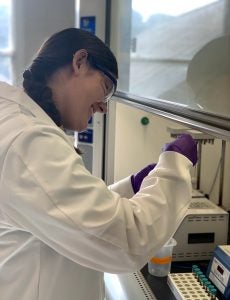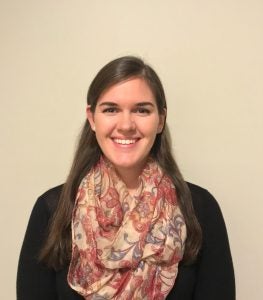June 8, 2021
Welcome to the eighteenth in our continuing series: GSO Profiles. Each post will feature a brief interview with a member of the GSO community. For the next few weeks we will feature GSO students who graduated over the past year. These profiles are one way we can celebrate the accomplishments of those graduating in this unusual time of COVID-19, and also welcome them to the ranks of GSO alums.
Angela Stahl recently finished her M.S. at GSO, working with GSO professor Kelton McMahon. But it was not her first experience at GSO, Angela had carried out an undergraduate honors thesis with GSO professor Rebecca Robinson. Her time on the Bay Campus helped Angela discover three things she loved: working with isotopes, answering questions with research, and SCUBA diving. Now that she has her degree Angela hopes to continue with all three of those.
Here’s Angela in her own words:
GSOP: Tell us about your work/research at GSO: what question(s) are you trying to answer?
AS: My research focused on identifying unique isotopic tracers of phytoplankton to study how they impact marine food webs and carbon cycles. We found these unique tracers are much more specific than previous literature had shown.
GSOP: What is your favorite thing about your work?

AS: I absolutely love working in the lab. It is very rewarding to see hard work come together—from myself and collaborators—to answer questions that will advance the field.
GSOP: What led you to your studies/career in ocean science?
AS: I always loved studying the sciences, mainly biology. While an undergrad, I took a few marine classes that really piqued my interest and lead me to pursue my degrees in ocean science.
GSOP: What brought you to GSO?
AS: I completed my B.S. in Marine Biology on URI’s main campus. During that time, I completed my honors thesis with GSO professor Rebecca Robinson looking at past oxygen levels using microscopic marine organisms from sediment cores. Towards the end of my B.S., I found GSO professor Kelton McMahon had an opening for a graduate student researching a related topic to what I had completed in the Robinson lab. Given my background and how interesting the research was, I joined the McMahon lab at GSO to pursue my M.S. in Oceanography.
GSOP: How have the COVID precautions affected you? What was it like defending your thesis virtually?
AS: The pandemic definitely created some setbacks for my research. The phytoplankton I was growing required care every few days, so when we were not permitted in the lab for an amount of time, it put a temporary halt on my research. However, I was fortunate enough to be far enough along in my research that I was able to use the time for computer-based work until we were able to return to the lab regularly.
Defending my thesis virtually was a different experience than I had imagined when I started grad school. I would say that it had its pros and cons, but overall I found it to be very exciting and rewarding.
GSOP: Who have been your role models or mentors?
AS: My role models and mentors would include GSO professors McMahon and Robinson, who both piqued my interest in isotopes and their versatility to answer various questions about marine systems. I love the research I do and am grateful for their guidance and advice throughout my time at URI-GSO. In addition, I look up to Alexandra Moen (URI Associate Diving Safety Officer) and Anya Hanson (GSO Diving Safety Officer) who are excellent teachers and mentors as they helped me through my scuba diving career which I love and hope to use more frequently in the future.
GSOP: What do you do for fun?
AS: I love to spend my time outdoors as much as possible, mostly hiking and swimming. I also love to scuba dive both recreationally and scientifically.
GSOP: What is your favorite spot or view at GSO?
AS: I always enjoyed the picnic tables under the trees outside of the Coastal Institute building.
GSOP: What is your advice for someone considering ocean science for their academic/professional career?
AS: Try to look for as many opportunities as possible to find what you enjoy doing. By participating in many different internships, positions, or volunteer opportunities, I was able to find something I thoroughly enjoyed studying.
GSOP: If you have had some time since your defense, what have you been doing since you finished your degree?
AS: I have not had much time since finishing at GSO, but I put together a presentation for a conference. In May, I attended the virtual Stable Isotope Ecology Conference where I presented the results of my M.S. thesis. It was a valuable experience to brainstorm additional ideas, answer questions, and speak about my work with other researchers in the field.
GSOP: What are your future plans?

AS: Soon I will start a new position as a Research Associate / Isotope Ratio Mass Spectrometer (IRMS) Lab manager at Louisiana State University in Dr. Michael Polito’s Isotope Ecology laboratory. Primary responsibilities are overall laboratory management including operation and maintenance of IRMS instrumentation, design and oversight of quality control procedures, financial planning and budgeting, and training of students and users of equipment in the facility. I am excited for the opportunity to work in a lab that looks to answer questions related to my M.S. research at URI-GSO.
Angela can be found on Twitter: @angelaRstahl
